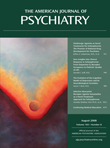To the Editor: We would like to suggest that the presence of mixed depression may have contributed to the findings reported in the study conducted by Christopher D. Schneck, M.D., et al.
(1) on predictors of rapid cycling, published in the March 2008 issue of the
Journal . The study sample was assessed at intake using the Montgomery-Åsberg Depression Rating Scale (MADRS) and the Young Mania Rating Scale. Although not specifically tested, concurrent mania/hypomania appeared to be positively correlated in Table 3. Features of the study sample frequently matched the clinical picture of “mixed depression,” as defined by the co-occurrence of syndromal depression and subsyndromal manic/hypomanic symptoms
(2 –
4) . Multivariate analysis revealed that severity of depression and concurrent mania/hypomania were independent predictors of more future episodes (polarity not specified). However, the MADRS and Young Mania Rating Scale odds ratios of 1.1 are of questionable clinical significance (and controlling for severity cannot eliminate many confounding variables in a naturalistic study). The association between severity (i.e., high MADRS and Young Mania Rating Scale scores) and more future episodes seems tautological, since severe depression may lead to increased use of antidepressants, which may worsen mixed depression and lead to a rapid-cycling course. There was no discussion of the effect on outcome of the co-occurrence of depression and manic/hypomanic symptoms (i.e., undiagnosed mixed depression). Kraepelin noted the worse outcome of mixed states (manic and depressive) compared with non-mixed states, which was replicated (but not noted) in the Schneck et al. study. The use of antidepressants in mixed depression (even when added to mood stabilizing agents) may worsen concurrent manic symptoms and increase switching to mania/hypomania
(2 –
4) . Most patients described in Table 3 of the article could be diagnosed as having mixed depression by a Young Mania Rating Scale score ≥6. It seems likely that, because of the naturalistic setting and the potentially missed diagnosis of mixed depression (which is not included in DSM-IV-TR), antidepressants were used for mixed depression. In addition to more switching, rapid loss of efficacy (a feature of bipolar depression) and aggressive-use antidepressants (likely to occur in difficult-to-treat bipolar depression) may also have linked rapid cycling with antidepressants. Thus, the problem may not be antidepressants themselves but the use of antidepressants in the treatment of mixed depression. In treating mixed depression, it seems useful to first control the concurrent manic symptoms through the use of mood stabilizing agents and later—if necessary—add an antidepressant cautiously
(2 –
4) . Regarding the debate on antidepressant-suicidality
(5), the problem does not seem to be the antidepressant but the misuse of a drug by clinicians.

